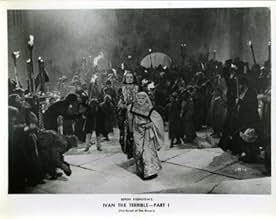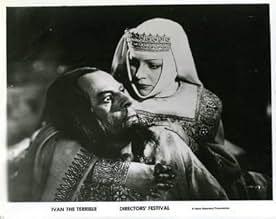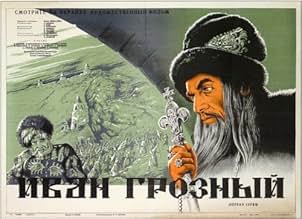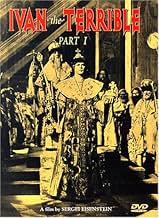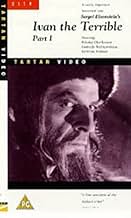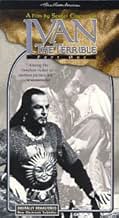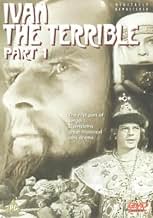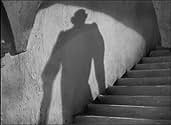CALIFICACIÓN DE IMDb
7.7/10
11 k
TU CALIFICACIÓN
Durante el inicio de su reinado, Iván el Terrible se enfrenta a la traición de la aristocracia e incluso de sus amigos más cercanos a la vez que busca unir al pueblo ruso.Durante el inicio de su reinado, Iván el Terrible se enfrenta a la traición de la aristocracia e incluso de sus amigos más cercanos a la vez que busca unir al pueblo ruso.Durante el inicio de su reinado, Iván el Terrible se enfrenta a la traición de la aristocracia e incluso de sus amigos más cercanos a la vez que busca unir al pueblo ruso.
- Dirección
- Guionista
- Elenco
- Premios
- 2 premios ganados y 1 nominación en total
Aleksandr Rumnev
- The Stranger
- (as Aleksandr Rumnyov)
- Dirección
- Guionista
- Todo el elenco y el equipo
- Producción, taquilla y más en IMDbPro
Opiniones destacadas
On a backdrop of intrigue, murder and betrayal, Prince Ivan conquers enemies and becomes the first Czar of all Russia, at the cost of his own soul.
Eisenstein's name and reputation loom over film history in such a forbidding way that you would be forgiven for deeming his work impenetrable by modern standards, yet while his silent epics are so seminal as to be hard to evaluate objectively, his late talking films can be hugely rewarding viewing, even to more casual film-goers. As a summation of his artistic evolution and scholarship, they are no less treasurable or significant than Battleship Potemkin, yet they have a more compelling story to tell.
Ivan The Terrible was to be a trilogy, of which only parts 1 and 2 were completed before their creator fell into disfavor with Stalin. Yet parts 1 and 2 are rich enough that together they form a perfect story ending on a chilling note. On to part 1 then...
Part 1 tells the story of Prince Ivan from young hopeful to warlord and recluse, before he truly accepts his calling. It is an incredibly romanticized tale, and formally, a relic of a time long gone, one that perhaps only ever existed in Eisenstein's mind. His was a unique visual sensibility and the Ivan films are full of layered, meticulously composed and designed shots: characters scurry like rodents through claustrophobic tunnels, the look is at times so expressionistic as to evoke where The Cabinet of Dr Caligari might have evolved. It is both familiar and horribly alien, like the nightmare it later confirms itself as in part 2.
Given the conflicting emotions evoked - heroism with oppression, epic scale but suffocating formalism - you would do well to brace yourself through this one and remember that only once you've seen both parts will it all make terrible sense. Only then will you appreciate the unique genius at work here.
One cannot distinguish between the two Ivans for one cannot exist without the other, and together, they form one of the best films ever made.
Eisenstein's name and reputation loom over film history in such a forbidding way that you would be forgiven for deeming his work impenetrable by modern standards, yet while his silent epics are so seminal as to be hard to evaluate objectively, his late talking films can be hugely rewarding viewing, even to more casual film-goers. As a summation of his artistic evolution and scholarship, they are no less treasurable or significant than Battleship Potemkin, yet they have a more compelling story to tell.
Ivan The Terrible was to be a trilogy, of which only parts 1 and 2 were completed before their creator fell into disfavor with Stalin. Yet parts 1 and 2 are rich enough that together they form a perfect story ending on a chilling note. On to part 1 then...
Part 1 tells the story of Prince Ivan from young hopeful to warlord and recluse, before he truly accepts his calling. It is an incredibly romanticized tale, and formally, a relic of a time long gone, one that perhaps only ever existed in Eisenstein's mind. His was a unique visual sensibility and the Ivan films are full of layered, meticulously composed and designed shots: characters scurry like rodents through claustrophobic tunnels, the look is at times so expressionistic as to evoke where The Cabinet of Dr Caligari might have evolved. It is both familiar and horribly alien, like the nightmare it later confirms itself as in part 2.
Given the conflicting emotions evoked - heroism with oppression, epic scale but suffocating formalism - you would do well to brace yourself through this one and remember that only once you've seen both parts will it all make terrible sense. Only then will you appreciate the unique genius at work here.
One cannot distinguish between the two Ivans for one cannot exist without the other, and together, they form one of the best films ever made.
This first part of Eisenstein's filming of the life and times of "Ivan the Terrible" has lots of drama, very good characterizations, fascinating settings, and plenty of action. Nikolai Cherkasov is completely convincing in the lead role, and the rest of the cast complements him well (especially Serafima Birman as his crafty aunt). This period in history is quite interesting and significant in itself, and Eisenstein presents everything in a fashion that is thoughtful and also enjoyable to watch.
Ivan combined a remorseless personal ambition with a genuine desire to strengthen and protect Russia, while the boyars, who opposed him, acted from motives that were almost exclusively personal. Combined with the plans of Russia's neighbors, all of this makes for a complex and interesting series of events, and the movie does a good job of presenting both the events and the possibilities, both on the surface and behind the scenes. Not the least of the reasons why it works so well are the settings. They are always interesting, believable, and atmospheric - and the indoor settings are especially so.
Part One is praiseworthy both in its own right and as the foundation for the outstanding sequel. Eisenstein generally excelled at depicting important periods in his country's history, and his series on Ivan's critical reign demonstrates all of his many skills. His attention to detail (of which there are too many examples even to try to list) and his appreciation for the overall picture make this a memorable film of high quality.
Ivan combined a remorseless personal ambition with a genuine desire to strengthen and protect Russia, while the boyars, who opposed him, acted from motives that were almost exclusively personal. Combined with the plans of Russia's neighbors, all of this makes for a complex and interesting series of events, and the movie does a good job of presenting both the events and the possibilities, both on the surface and behind the scenes. Not the least of the reasons why it works so well are the settings. They are always interesting, believable, and atmospheric - and the indoor settings are especially so.
Part One is praiseworthy both in its own right and as the foundation for the outstanding sequel. Eisenstein generally excelled at depicting important periods in his country's history, and his series on Ivan's critical reign demonstrates all of his many skills. His attention to detail (of which there are too many examples even to try to list) and his appreciation for the overall picture make this a memorable film of high quality.
Perhaps if I had not watched von Sternberg's SCARLET EMPRESS the day before I watched IVAN THE TERRIBLE, I would have appreciated Eisenstein's film more.
SCARLET EMPRESS is von Sternberg's own historical Russian epic: Catherine the Great (played by Marlene Deitrich) rises to power despite conspiracies against her--conspiracies much like the ones that face Ivan in Eisenstein's film. The films are remarkably similar, and Eisenstein's influence on von Sternberg's lighting and montage sequences could not be more apparent.
Unfortunately, IVAN THE TERRIBLE is light years behind SCARLET EMPRESS in terms of the integration of sound with image, humanistic characterizations, and nuanced (as opposed to exaggeratedly theatrical) acting styles. If I had to guess, I'd say IVAN THE TERRIBLE was made ten years before SCARLET EMPRESS. In fact, it was made ten years after.
I'm a big fan of Eisenstein's BATTLESHIP POTEMPKIN, and as a student of Russian history and culture, I expected IVAN THE TERRIBLE to be a thoroughly engaging film. Instead it seemed a primitive effort: a move backward for a man who excelled at silent storytelling but couldn't evolve along with cinema. Of course, this IS Eisenstein, and IVAN is a very intelligent and well-crafted film, but viewed alongside its contemporaries, its shortcomings become all too apparent.
SCARLET EMPRESS is von Sternberg's own historical Russian epic: Catherine the Great (played by Marlene Deitrich) rises to power despite conspiracies against her--conspiracies much like the ones that face Ivan in Eisenstein's film. The films are remarkably similar, and Eisenstein's influence on von Sternberg's lighting and montage sequences could not be more apparent.
Unfortunately, IVAN THE TERRIBLE is light years behind SCARLET EMPRESS in terms of the integration of sound with image, humanistic characterizations, and nuanced (as opposed to exaggeratedly theatrical) acting styles. If I had to guess, I'd say IVAN THE TERRIBLE was made ten years before SCARLET EMPRESS. In fact, it was made ten years after.
I'm a big fan of Eisenstein's BATTLESHIP POTEMPKIN, and as a student of Russian history and culture, I expected IVAN THE TERRIBLE to be a thoroughly engaging film. Instead it seemed a primitive effort: a move backward for a man who excelled at silent storytelling but couldn't evolve along with cinema. Of course, this IS Eisenstein, and IVAN is a very intelligent and well-crafted film, but viewed alongside its contemporaries, its shortcomings become all too apparent.
I've seen this a number of times now so it's difficult for me to remember having trouble getting into the stylised form of acting and by 1944 dated expressionistic cinematography that other viewers might have. First time of watching it was on UK TV over 20 years ago with Part 2 and a documentary called Part 3 containing the remaining extant scenes, and I loved it. I'm dead against arty farty pretentious movies and am always aware that being obscure does not automatically make a film a classic, but this really is a classic of its kind. It was Eisenstein's best work (imho) a rallying call to all of the disparate inhabitants of Mother Russia to work and fight together, which was ordered by Stalin and who was pleased with the similarities I bet he was on tenterhooks waiting for Ivan to go insane though.
Ivan is crowned Tsar of all the Russias and proceeds to drag the country into the 16th century, disposing of external enemies in the form of Tartars, starting a long war against Livonia and limiting the influence of the antagonistic aristocracy, the boyars. The acting is intensely melodramatic, with endless sinister sidelong glances taken from acute camera angles and Ivan's pointy beard shown to good advantage, which to people not paying much attention can probably be mirth-inducing. But this was pulse-quickening propaganda for the new Russian working class to comprehend, not Artheads decades later - Eisenstein did it so memorably that like Potemkin it's still spellbinding today. Otoh he borrowed extensively from Snow White too for some of most incredible shadowy images in here, and his whole technique hadn't moved on from silent film. The use of the b&w nitrate film, costumes, sets and angular ugly faces are wondrous to behold and Prokofiev's stirring music glues it all together triumphantly.
All in all, a knockout film with faults but which still defies and will survive all criticism.
Ivan is crowned Tsar of all the Russias and proceeds to drag the country into the 16th century, disposing of external enemies in the form of Tartars, starting a long war against Livonia and limiting the influence of the antagonistic aristocracy, the boyars. The acting is intensely melodramatic, with endless sinister sidelong glances taken from acute camera angles and Ivan's pointy beard shown to good advantage, which to people not paying much attention can probably be mirth-inducing. But this was pulse-quickening propaganda for the new Russian working class to comprehend, not Artheads decades later - Eisenstein did it so memorably that like Potemkin it's still spellbinding today. Otoh he borrowed extensively from Snow White too for some of most incredible shadowy images in here, and his whole technique hadn't moved on from silent film. The use of the b&w nitrate film, costumes, sets and angular ugly faces are wondrous to behold and Prokofiev's stirring music glues it all together triumphantly.
All in all, a knockout film with faults but which still defies and will survive all criticism.
If Alexander Nevsky was a filmed opera, this one, the first part of Eisenstein's incomplete trilogy about the title character, looks more like a Stalinist version of a Shakespere play, with a lot of conspiracy and characters so desirous for power that are willing to do whatever it takes, but manichaeist and with almost undisguised propaganda of the infamous Russian dictator. Exactly for being theatrical, it is too formal, but it is so intense that it is impossible to be indifferent, the visual composition is extraordinary, using very well the light-and-shade game typical of the German Expressionism, the alternation between very open shots and close ups, and very rich costumes and set decoration. In the end, although it is not perfect, is a remarkable film that deserves all the praise it received.
¿Sabías que…?
- TriviaTook over 3 years to make.
- ErroresAfter Anastasia's death, when discussing the Livonian war the "only" son of the Czar is mentioned. However at the time Ivan had two sons, Feodor, who became Czar Feodor I of Russia, and also Tsarevich Ivan Ivanovich.
- Citas
Czar Ivan IV: Those who tore down the bells without Czar's permission, those by Czar's command get torn down the heads for not too long.
- Créditos curiososAll the credits are showed in front of a fire smoke.
- ConexionesEdited into Histoire(s) du cinéma: Une histoire seule (1989)
Selecciones populares
Inicia sesión para calificar y agrega a la lista de videos para obtener recomendaciones personalizadas
- How long is Ivan the Terrible, Part I?Con tecnología de Alexa
Detalles
Taquilla
- Total a nivel mundial
- USD 12,196
- Tiempo de ejecución1 hora 43 minutos
- Color
- Mezcla de sonido
- Relación de aspecto
- 1.37 : 1
Contribuir a esta página
Sugiere una edición o agrega el contenido que falta

Principales brechas de datos
What is the German language plot outline for Iván el Terrible (1944)?
Responda

